
8 Best HR Software for Startups in 2024
HR software is so effective for companies looking to find, hire, and onboard candidates that it has become a mainstay in a recruiter’s toolkit. The benefits of HR software are too compelling. For example, according to recent research, almost seven out of ten recruiters said that automation, AI, or technology help them fill jobs faster. Not to mention that candidates with a smooth recruiting process—which is easier to achieve with HR software—are likely to stay longer.
Now, is HR software only for corporations with big wallets, or can lean startups also rely on it? Companies of different sizes may need to meet various needs and budgets. So, is there HR software for startups that’s ready to scale up as the business does? If so, which are the best HR tools for startups? In this blog post, we’ll answer these questions and discuss the best startup HR tools and software in depth.
What Is HR Software?
First, let’s explain what HR software does so we can continue to see why it’s so important for startups.
HR software is a tool for human resource management that helps reduce manual work and simplifies various HR management tasks through the use of digital systems and technology. HR professionals can save time, reduce errors, and concentrate on strategic activities by automating tasks like payroll management, benefits enrollment, asset management, or even PTO approval.
Why Is HR Software Important for Startups?
Building a startup? You're likely juggling a million tasks, from attracting top talent to securing funding. As a founder or as someone close enough to them, you’ll see quick benefits from having a really solid HR software foundation. Manual HR processes can quickly become cumbersome and error-prone—which is out of the question for a lean startup. This is where HR software for startups steps in, offering automation and simplifying your HR tasks, freeing you to focus on growth.
These are the different ways in which HR software solutions for startups can be highly useful for you:
Easier Recruitment
The “finding the perfect fit” chestnut might sound like a stretch, but it’s a business necessity for startups. Since you're probably not in a position to afford to try people out until you “hit the nail on the head,” you should make finding the right person as easy as possible and as quickly as possible. Of course, this is easier said than done.
HR software for startups simplifies the hiring process by allowing you to post job openings on your very own Careers microsite, manage applications, and screen resumes—all from a central hub, helping startups find the perfect fit quickly.
Paperwork, Done by Your Computer
Onboarding new hires, managing leave requests, getting the updated HR figures ready for an investor pitch deck, and filing a special request for a new laptop battery can quickly become overwhelming and costly. The common thread among these? They take time, and they could need plenty of approvals, even in a small-scale company like a startup. HR software for startups automates these paperwork-heavy processes, which is a proven timesaver as it will ease up the approval process. In fact, according to a report, HR managers say they lose 14 hours a week on average due to a lack of automation. Time to do something about that!
Simplified Daily Tasks
Managing your attendance tracking, leave, payroll services, and time-off requests is simple when you have the bandwidth, but too hard when you’re spread thin. HR software for startups automates these simple tasks and lets employees do their part—like requesting their days of leave from a centralized platform.
Improved Compliance
Staying compliant can be a challenge for startups that are just learning to deal with the employment regulations of the state where they’re hiring. HR software for startups can make sure your practices meet the regulations and make reports to keep you audit-ready.
Improved Performance Management
HR software for startups helps with performance reviews by providing tools to set goals, track progress, and conduct feedback sessions. This structured and data-driven approach to employee performance management is aligned with what investors want: numbers and measurable successes, not just first impressions of how the new VP of Sales has been feeling.
Essential Features of an HR Software for Startups
When evaluating your options for the perfect HR software solution for startups, our advice is to consider the following key features:
Budget-Friendly Scalability
HR software for startups should scale up. This means it should be affordable when the company has just started, but should keep up with the pace once the startup grows. If the company size blows up because of a Series A investment, the right HR software also should be able to handle any influx of new hires without bowing to pressure. Cloud-based SaaS solutions with a subscription are excellent options because they’re affordable and will steer clear of the grueling process of migrating if the company suddenly takes off.
Onboarding Automation
Onboarding new hires is definitely one of the most time-consuming HR processes. It’s also very impactful in the long run: A good onboarding process can lead to greater retention. HR software for startups should include onboarding automation. Onboarding is sometimes split off from HR software workflows and requires a different tool entirely, and that’s not for the best.
Time Off Tracking and Leave Management
A comprehensive HR software for startups must allow your employees to submit leave requests electronically and track their remaining time off. This simplifies the leave approval process and eliminates the need for paper-based requests.
Keep Payroll Data in One Place
HR software for startups should help you keep payroll for a multi-group workforce in one place. You should be able to handle interns, and part-time and full-time employees with a clear segmentation.
Metrics and Feedback, Easy to Gather
Certain HR software for startups also provides tools for 360-degree feedback so that employees can rate experiences with their management or their colleagues. The same employee engagement tools will be more convenient if they also offer people analytics. It’s the best way to match reviews with performance.
Data Security
Startups that use HR software with industry-proven security measures will likely stay compliant when they’re happily forced to register a new company elsewhere.
Key Factors To Consider Before Choosing an HR Software
HR software platforms might promise the heavens, but they have their shortcomings—especially if they’re spread too thin. A recent survey indicated that over half of companies using the HR software features and automation for hiring have faced difficulties using the software.
Keeping this in mind, here are some important aspects you should keep in mind when choosing an HR software for startups:
Company Size and Needs
Startups have particular needs compared to larger companies. Choose a solution that can scale with your growth. Look for HR software for startups that offers features relevant to your current stage but can also expand as you add more employees and functionalities become necessary. For example, a basic applicant tracking system (ATS) might perform the job initially, but as your hiring needs grow, you might need features like onboarding automation or performance management tools.
Budget
Be upfront about your budget and choose an HR software for startups solution that offers the key features you need at a reasonable price. The HR software cost can be misleading if you'll be forced to migrate your employee management software as soon as your company takes off.
Many vendors offer tiered pricing plans, allowing you to scale your investment as your company grows. Don't be afraid to negotiate or explore free trials to ensure you get the most out of your money.
Ease of Use
A user-friendly interface is especially important for startups with just a few people handling HR tasks. Choose an HR solution that's intuitive and requires minimal training. Look for features like a clean interface, clear navigation, and plenty of help resources. Also, if it’s cloud-based and easy to set up, you’ll be on the right track as well.
Integrations
Ensure the HR software for startups integrates easily with existing tools you use, such as messaging apps, payroll providers, accounting software, or project management platforms. The best way to check if your HR software will help your startup with integrations is to confirm whether it offers a well-documented API.
8 Best HR Software for Startups in 2024
Well, now that you know what HR software for startups is, why it’s so important, its essential features, and what to consider when considering your options, let’s see which alternatives you effectively have.
These are the best HR software for startups:
1. TalentHR: Best for All Core HR Needs
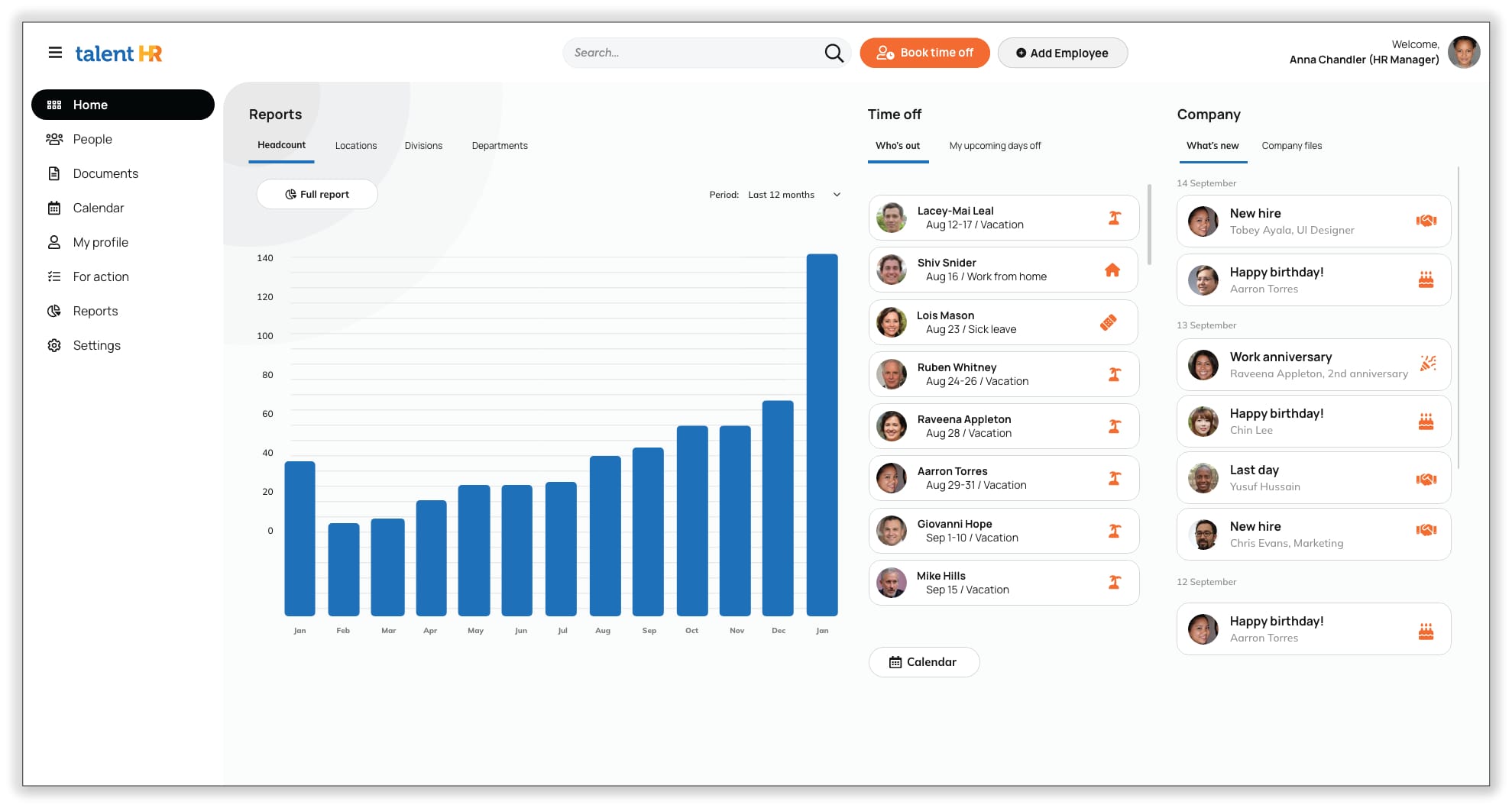
TalentHR is a comprehensive HR process automation platform that fully aligns with startups’ challenges. It helps HR teams handle daily needs. Its all-in-one functionality and specialized features allow young, growing companies to meet their particular goals, making it ideal HR software for startups. And they can do it affordably.
Here's what TalentHR has to offer to your startup:
- Reduced costs and scalability: As startups often have limited budgets and resources, TalentHR offers a freemium model, allowing you to access core HR functionalities like applicant tracking and benefits management at no initial cost for up to 10 users.
- Simplified processes: It automates core HR processes, freeing up time that HR professionals can use to the startup’s advantage. Features like automated onboarding and time-off management simplify workflows and alleviate administrative workloads.
- Centralized data and easy access: While startups typically operate with distributed teams or limited physical space (like a Silicon Valley garage), TalentHR provides a centralized location for all employee data, available from anywhere.
- Focus on building your team: Its applicant tracking system and onboarding tools simplify recruitment and create a smooth new hire experience. All these steps are part of the recruitment lifecycle under TalentHR.
- Careers page with global reach: TalentHR allows you to run your job ads on your custom domain, so you can launch a Careers page where you can collect your open positions. Recruiting a multilingual workforce? TalentHR currently supports 14 languages.
- AI-assisted job descriptions: If your HR team—or sole HR representative—needs help fine-tuning a compelling job description, they can rely on the platform’s AI writer.
In essence, TalentHR is an ideal match for startups seeking an affordable, user-friendly, and scalable HR solution. By automating tasks, centralizing data, and offering a comprehensive suite of features, TalentHR allows you to focus on what really matters: helping your startup grow by bringing onboard the best people in your niche.
2. Gusto: Best for Payroll Needs
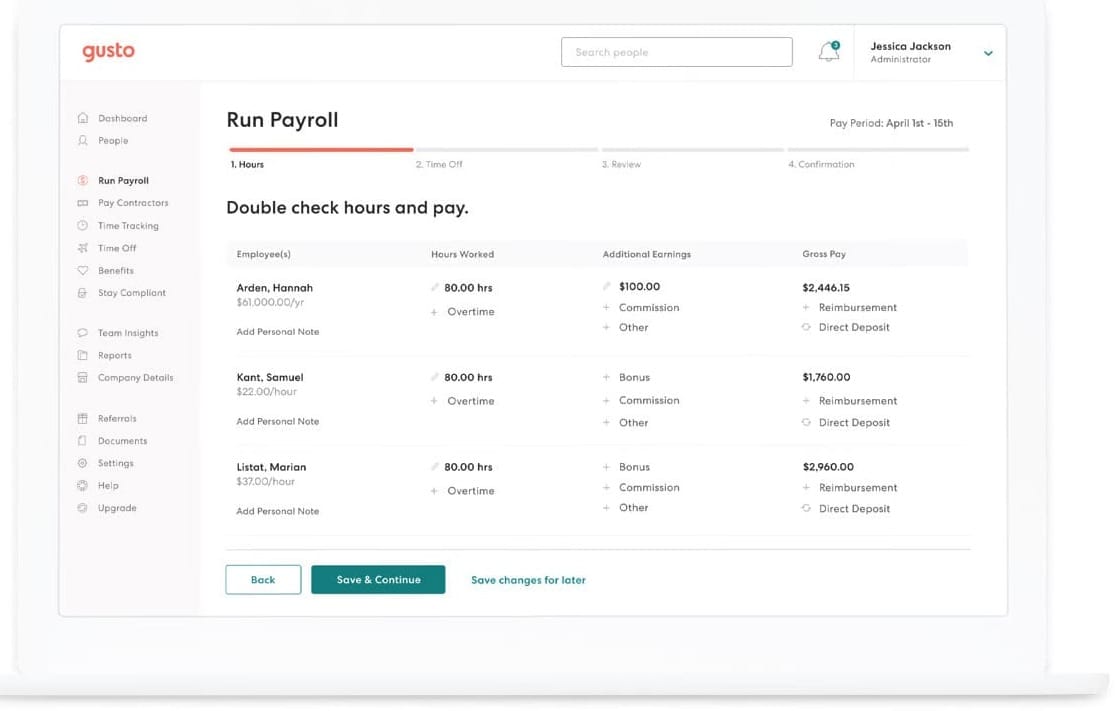
Gusto is a payroll solution that helps manage a multi-country workforce. It’s an HR platform tool that simplifies payroll and employee benefit administration. It automates payroll calculations, tax filings, and benefit enrollment tasks. Additionally, Gusto may integrate with existing accounting or timekeeping software.
Gusto offers various pricing plans. Some might not fit your company's needs and size—especially if you’re a startup that's highly watchful of its funds. Reviews suggest that Gusto is generally considered user-friendly. However, the ease of use may vary depending on the complexity of your business's payroll processing and benefit requirements.
3. Workable: Best for Hiring Needs
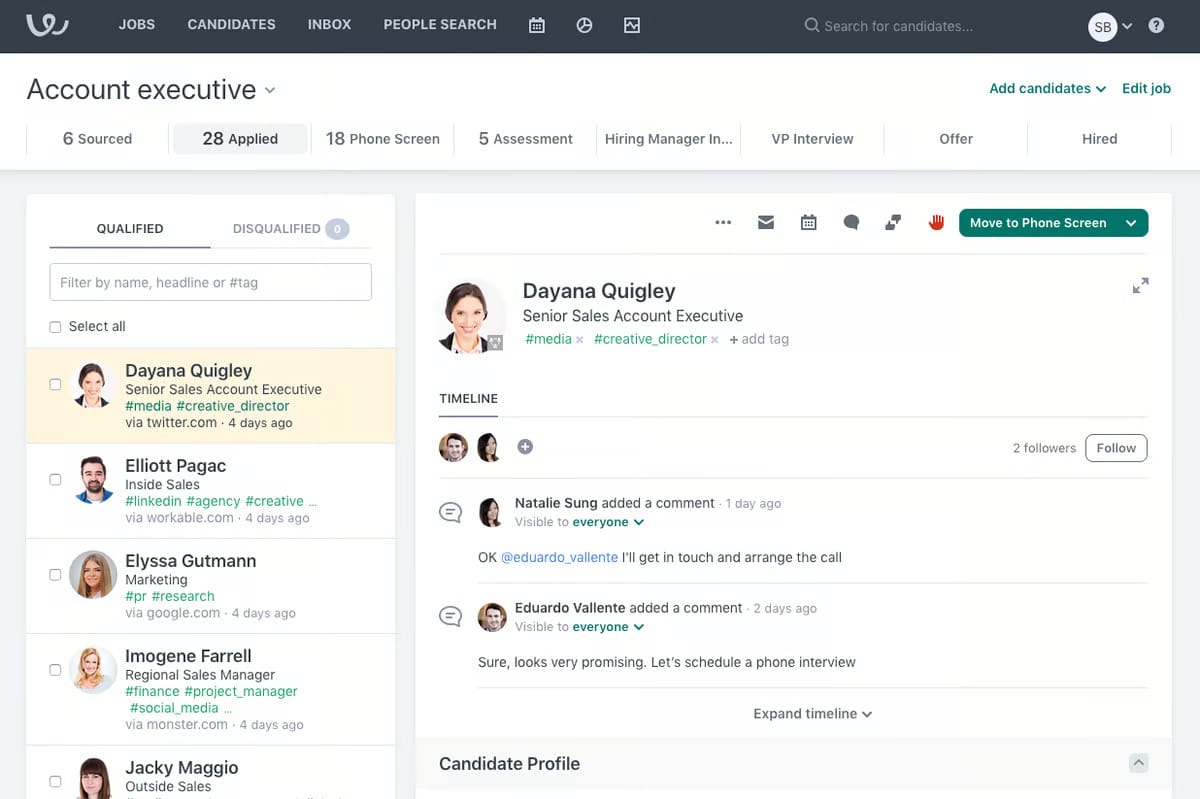
Workable is an ATS, and, as such, it should optimize a company's hiring process. It provides a centralized platform for managing the entire recruitment journey. This includes posting jobs on various platforms, collecting resumes electronically, and screening applications based on predetermined criteria, a typical ATS feature.
Workable also provides features like skill assessments and interview scheduling tools. Be mindful of skill assessments, since many candidates consider them a time sink that yields no benefit.
4. Deputy: Best for Employee Scheduling Needs
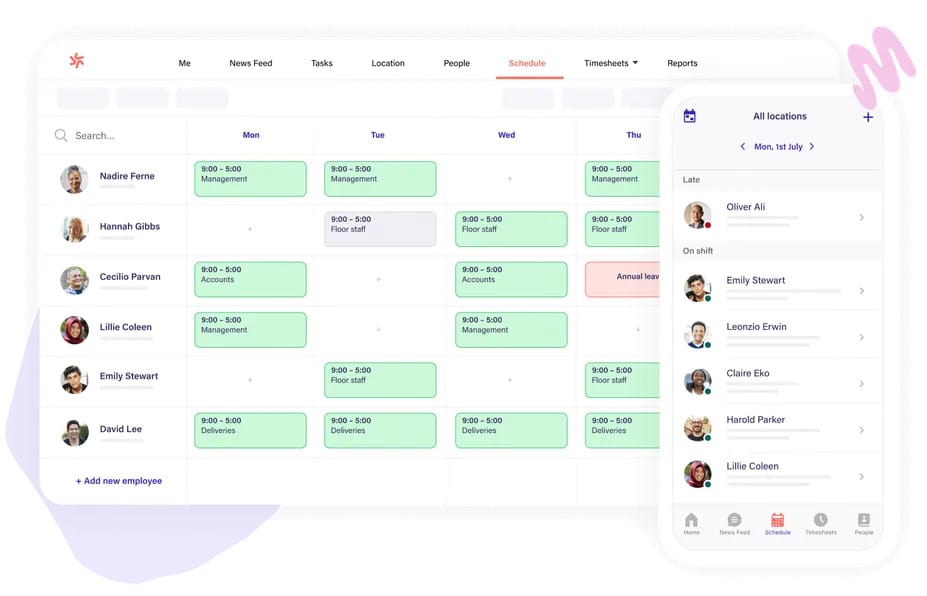
Deputy is a suitable option for businesses with shift-based operations or geographically dispersed teams as it simplifies employee scheduling, making communication easier to manage. It functions as a centralized platform for creating and managing employee schedules. This includes defining work schedules, assigning shifts, and tracking attendance.
It offers features like online clock-in/out and timesheets. Additionally, Deputy facilitates team communication by allowing employees to access schedules, swap shifts, and communicate with managers directly through the platform. Many employees still prefer to leave these tasks to an all-around communications platform with easy-to-set-up automation, like Slack.
5. Remote: Best for Remote Team Needs
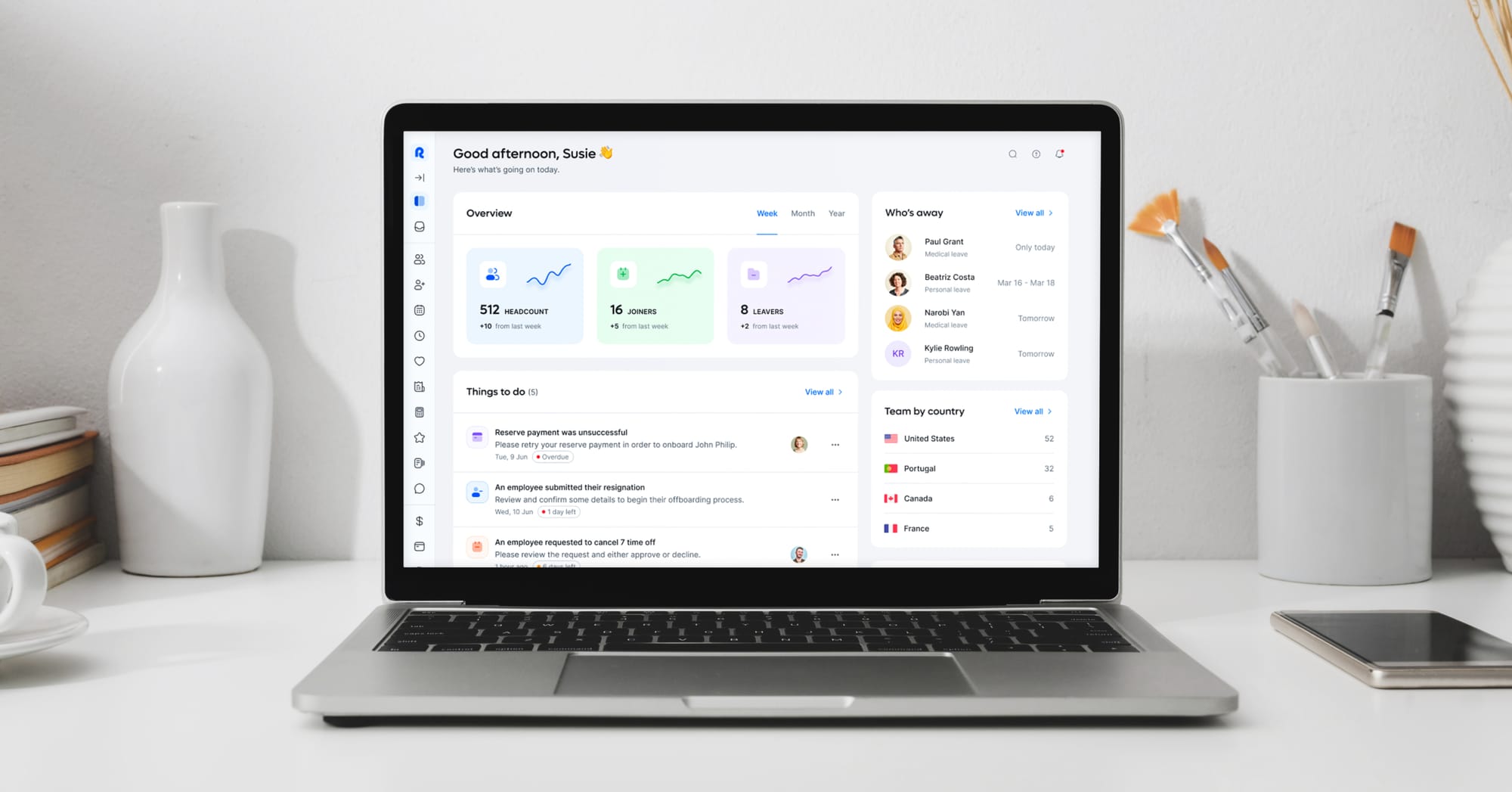
As its name anticipates, Remote helps companies hire internationally. Since many remote workers prefer to be onboarded as contractors, Remote is especially helpful for startups that handle contractors and full-time employees while staying compliant.
6. Trinet: Best for Benefits Needs
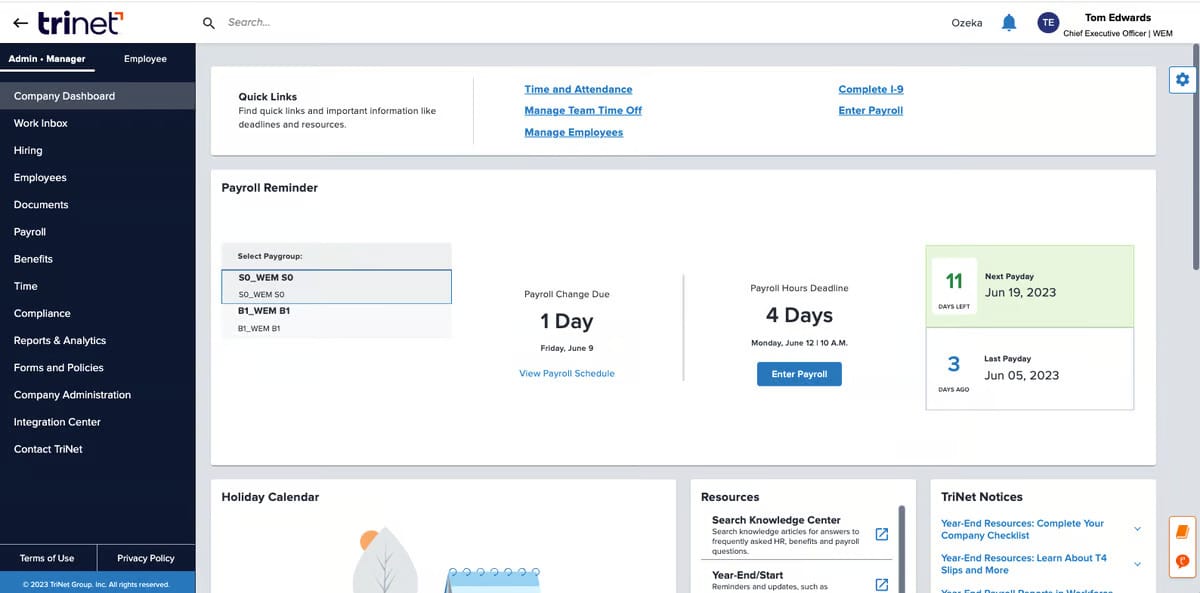
Specializing in employee benefits administration, Trinet helps startups provide competitive benefits packages to their employees, promoting retention and satisfaction within the workforce. Small companies, including startups, have an excellent opportunity to become competitive by offering benefits. Trinet could help sort it out in a single dashboard.
7. Culture Amp: Best for Employee Experience Needs
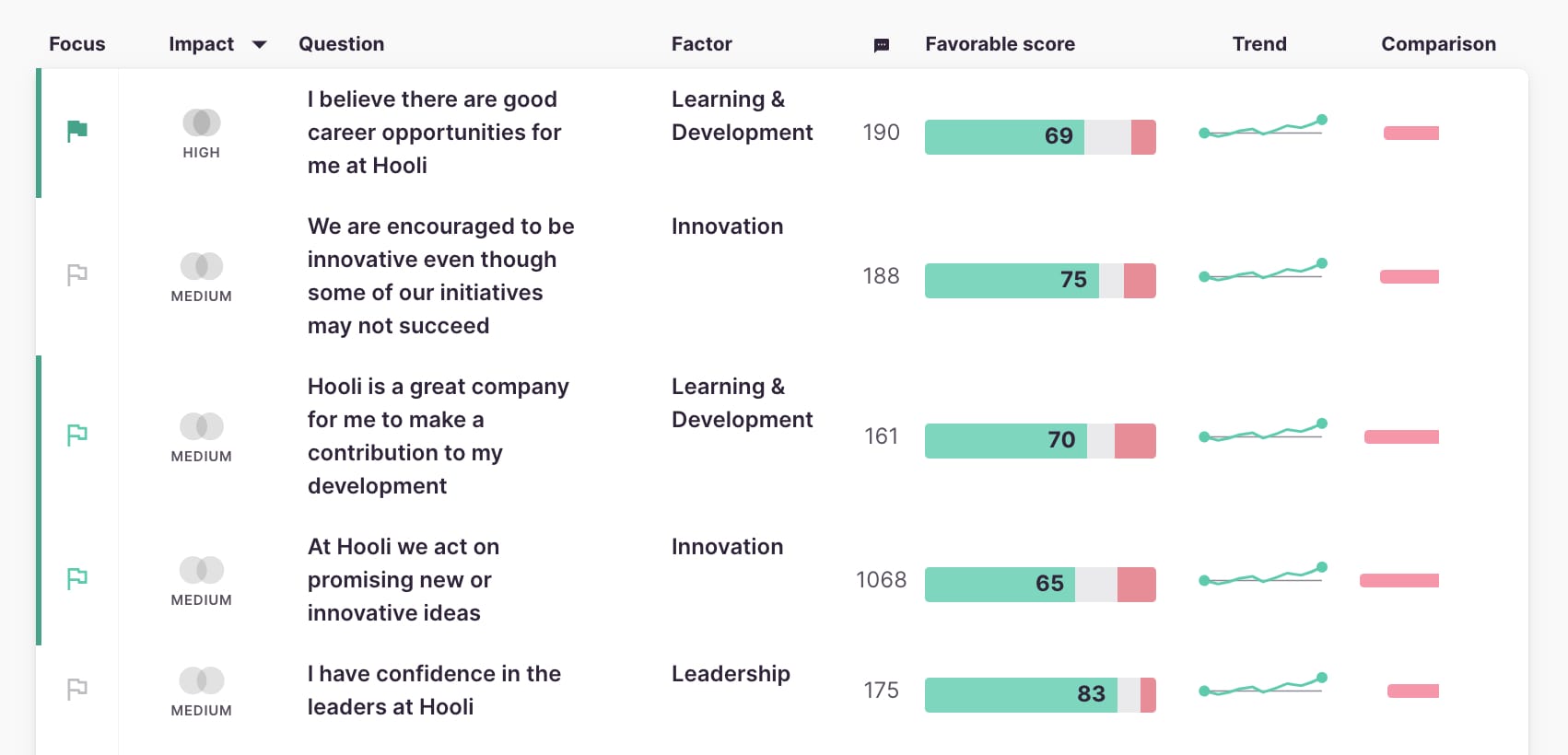
Culture Amp focuses on providing information about employee experience. It offers functionalities like employee engagement surveys, recognition programs, and feedback channels.
However, keep in mind that Culture Amp might not directly address all aspects of employee experience, and its effectiveness might depend on the company's existing culture. The best HR software for startups should include plenty of perspectives to make each input count. For example, people analytics that help confirm the opinions on feedback channels are better paths to act on.
8. Monday.com: Best for Task Management Needs
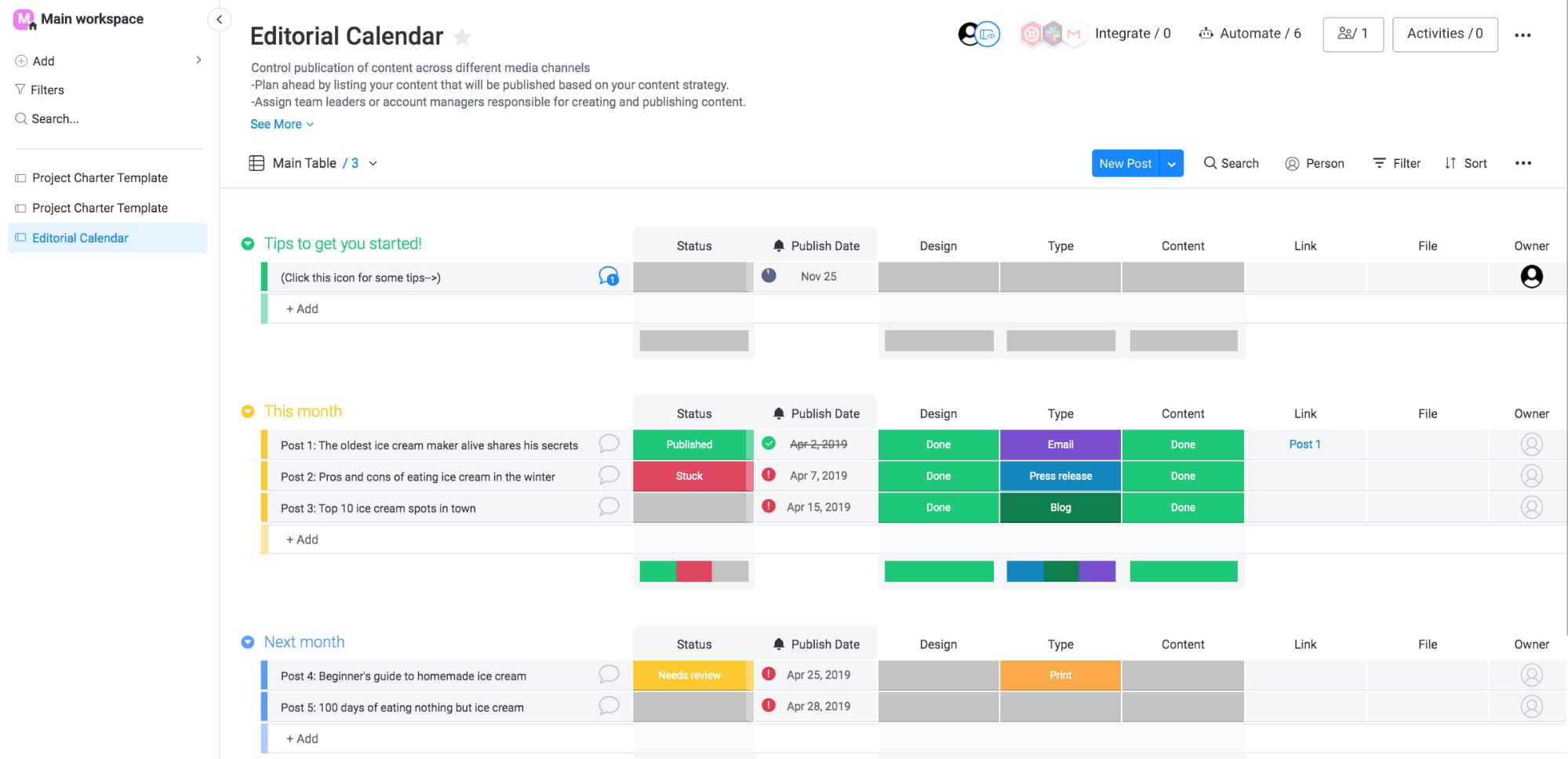
While not strictly HR software, Monday.com excels in task management. It offers features for assigning tasks, tracking progress, collaborating on projects, and visualizing workflows. It can be excellent for startups with tight-knit HR teams that need to know what each recruiter is up to.
This tool is very versatile. Creatives, marketers, and salespeople use it. The downside is that it will require some adaptation for specific HR processes depending on the businesses’ needs. It can still work as competitive HR software for startups, but it could turn out to be too siloed if compared to all-around solutions.
Looking for Specialized Solutions?
While the tools we've covered are versatile and designed to meet the general needs of startups, there are niche HR platforms tailored to specific industries. If you're opening a healthcare practice, consider software built specifically for medical professionals. Let’s explore one such specialized solution.
HR For Health: Best HR Software For Healthcare
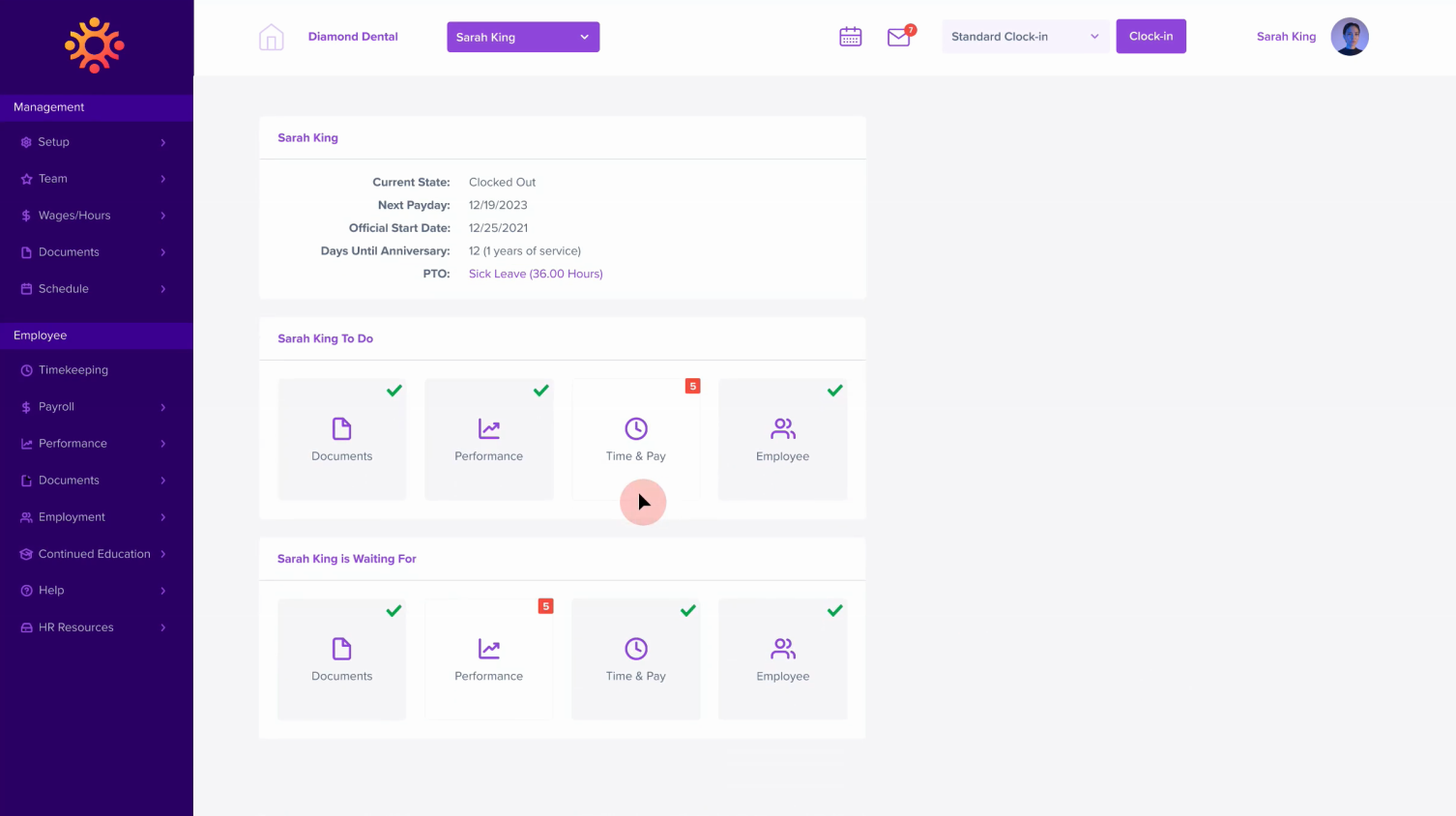
When opening a new healthcare practice, founders are entering a world of business management that medical school might not have prepared them for. In this situation, a custom-built platform for medical practices will provide more specialized features and support to help practice owners comply with relevant labor laws. HR for Health provides an all-in-one HR solution with tools to streamline HR management, ensure compliance, and enhance team collaboration. With on-demand support from a team of trained medical HR specialists, it provides an ideal platform for small to mid-sized healthcare organizations without a full HR department. From managing payroll and scheduling to navigating industry regulations, HR for Health simplifies complex processes, enabling medical professionals to focus on delivering quality care while reducing administrative burdens.
- Automate daily HR tasks like PTO requests and employee handbook updates
- Easily onboard new hires with state and federal-compliant, date-stamped documentation
- Run payroll effortlessly with automatic integration with time clock records, employee scheduling, time off requests, overtime, and more
- Access a dedicated team of medical HR experts to answer the toughest HR questions
- Ensure compliance with healthcare regulations by tracking required certification and training deadlines
Implement HR Software for Startups with All-in-One Tools
HR software for startups helps you achieve your business goals by automating the tedious part of the process—and making HR tasks fast-paced, as a startup demands. TalentHR provides a simplified solution offering a single platform to efficiently manage your workforce, track specific employee data, and easily onboard new hires. It’s an ideal HR software for startups—or for companies of any size.
Register now for free and automate HR tasks as soon as possible.
To learn more about HR solutions for startups, visit TalentHR.

![3 Best HR Automation Tools to Save Time (And Money) [2025]](/content/images/size/w600/2025/07/3-Best-HR-Automation-Tools--2025-.png)
